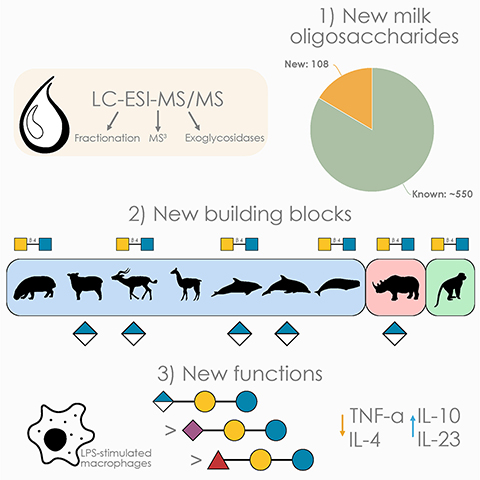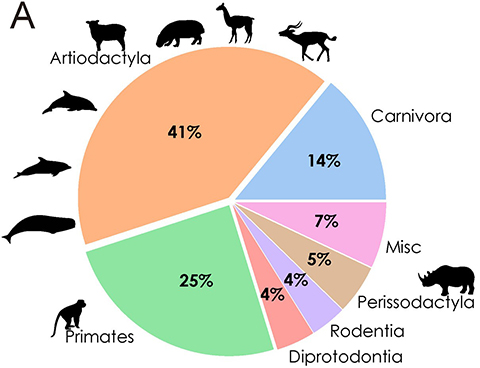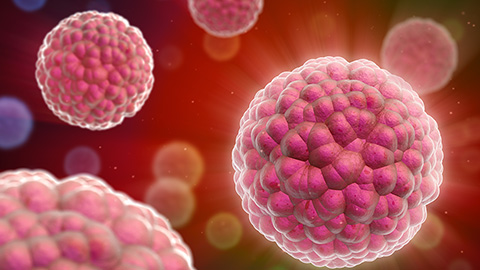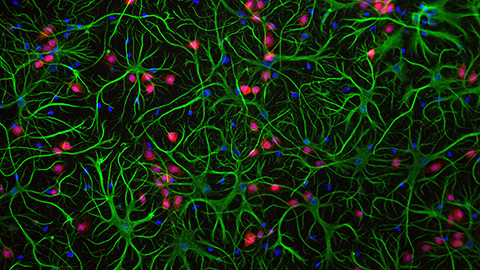Breast milk from rhinos and dolphins and whales, oh my!
A recent study has uncovered that the components of breast milk from land and sea mammals possess immunomodulatory components that may promote healthy microbiome colonization in offspring. These findings could inform efforts to develop better formula for human and animal infants.

The American Academy of Pediatrics and the World Health Organization recommend that mothers exclusively breastfeed their babies for the first six months of life, because it promotes infant survival and a healthy immune system. However, less than 30% of infants are breastfed, due to a variety of reasons such as maternal health and lack of support and resources. Therefore, there is a need to develop formula that more accurately mimics breast milk to promote the health of future generations.
According to Daniel Bojar, an assistant professor of chemistry and molecular biology at the University of Gothenburg in Sweden, scientists need to know more about nonhuman breast milk. Bojar oversaw the new study, which was published in the journal Molecular & Cellular Proteomics.
“For nearly all mammals, we have shallow or zero knowledge about what makes up their breast milk sugars,” Bojar said. “Knowledge from these species can shed light on human milk and therapeutic opportunities. Ultimately, this story is about the amazing things that nature has created and how we are just beginning to unlock their secrets. It's a tale of discovery, of nature's wonders and of the universal bond between mothers and their children.”
Bojar and colleagues examined breast milk from nine understudied mammal species: alpaca, beluga whale, black rhinoceros, bottlenose dolphin, impala, L'Hoest's monkey, pygmy hippopotamus, domestic sheep and striped dolphin. They found that the collective mammalian breast milk contained more than 100 novel milk sugars, including glucuronic acid, and these sugars were shared across species. According to Bojar, glucuronic acid is also found in cartilage and connective tissues.

After identifying these new milk sugars, Bojar’s team wanted to know what purpose they serve. The team exposed macrophages, an immune cell responsible for ingesting foreign invaders, to glucuronic acid-containing milk sugars and observed how it influenced the macrophage behavior and activation. Glucuronic acid dampened macrophages’ inflammatory response to bacteria, indicating that this milk sugar could help prevent excessive immune activation, common in autoimmune diseases, and promote healthy microbiome development in infants.
“We showed that these special sugars are advisers that help the baby's immune system make better decisions,” Bojar said. “In particular, these new molecules seem to aid in the development of the infant microbiome by allowing the good kind of bacteria to colonize the infant gut.”
Bojar said his team’s future work will focus on further dissecting the novel milk sugars found in these mammals and others. He said the findings could be beneficial for creating better human formula that promotes a healthy microbiome.
“Understanding these ‘super ingredients’ can lead to exciting possibilities, such as creating better baby formula or finding new ways to strengthen our immune systems,” Bojar said. “By understanding the powerful properties of breast milk across different animals, we can potentially design better infant formulas that mimic some of these beneficial qualities. For many babies who cannot be breastfed for various reasons, this could be a game changer.”
Enjoy reading ASBMB Today?
Become a member to receive the print edition four times a year and the digital edition monthly.
Learn moreGet the latest from ASBMB Today
Enter your email address, and we’ll send you a weekly email with recent articles, interviews and more.
Latest in Science
Science highlights or most popular articles

Building a career in nutrition across continents
Driven by past women in science, Kazi Sarjana Safain left Bangladesh and pursued a scientific career in the U.S.

Avoiding common figure errors in manuscript submissions
The three figure issues most often flagged during JBC’s data integrity review are background signal errors, image reuse and undeclared splicing errors. Learn how to avoid these and prevent mistakes that could impede publication.

Ragweed compound thwarts aggressive bladder and breast cancers
Scientists from the University of Michigan reveal the mechanism of action of ambrosin, a compound from ragweed, selectively attacks advanced bladder and breast cancer cells in cell-based models, highlighting its potential to treat advanced tumors.

Lipid-lowering therapies could help treat IBD
Genetic evidence shows that drugs that reduce cholesterol or triglyceride levels can either raise or lower inflammatory bowel disease risk by altering gut microbes and immune signaling.

Key regulator of cholesterol protects against Alzheimer’s disease
A new study identifies oxysterol-binding protein-related protein 6 as a central controller of brain cholesterol balance, with protective effects against Alzheimer’s-related neurodegeneration.

From humble beginnings to unlocking lysosomal secrets
Monther Abu–Remaileh will receive the ASBMB’s 2026 Walter A. Shaw Young Investigator Award in Lipid Research at the ASBMB Annual Meeting, March 7-10 in Washington, D.C.

